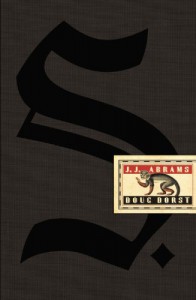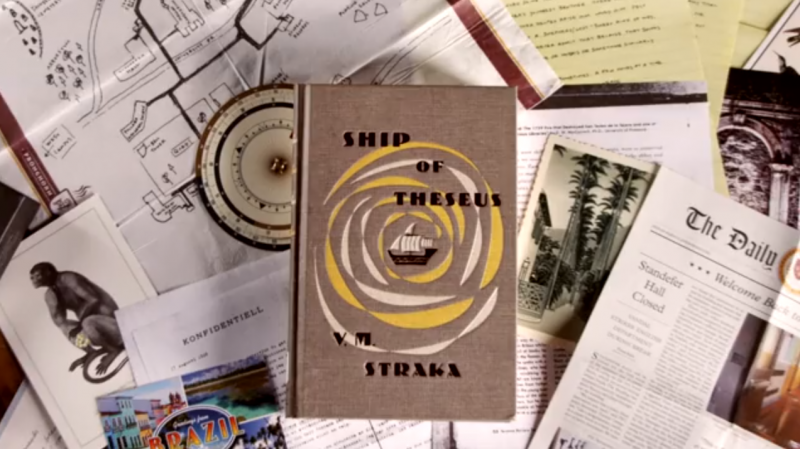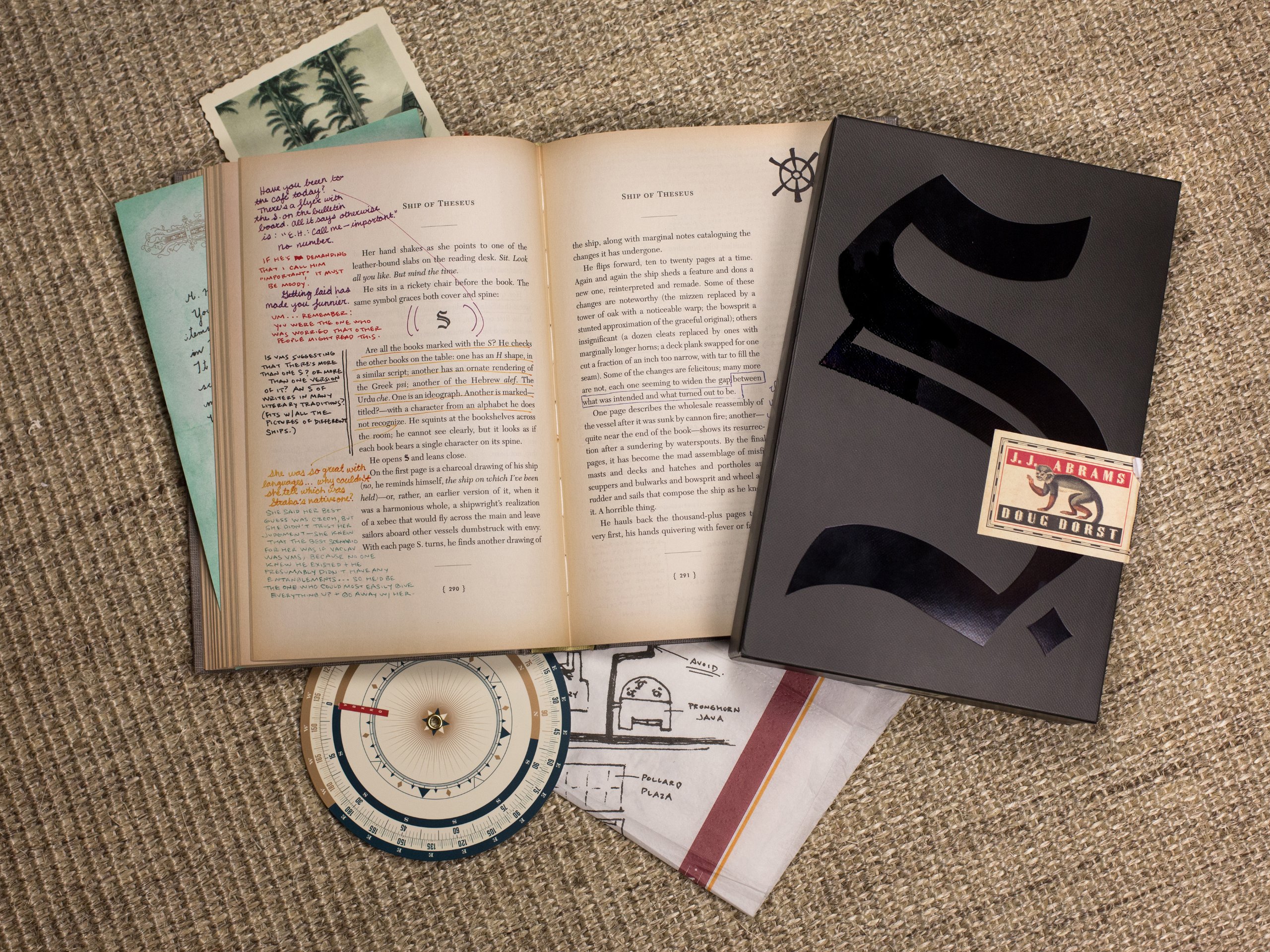

Through sheer tenacity, I finished this "book" (I am not mocking it by putting it in quotations like this, as you are about to see, this is less of a traditional book and more of an experience in eavesdropping) and, five months later, I can safely say that I "finished" the material in the book, but I still think that, even being the smart girl that I am, a lot of it went right over my head.
Spoiler-free Portion
"Follow the monkey."
You want the quick n' dirty? Very well; have you ever tried House of Leaves? I ask only because, frankly, if you haven't tried THAT, then this one is going to be a question mark for whether you'll enjoy this concept or not. That is not to say that if you haven't read HoL, that you are clearly a moron/ect./ect - really, this is, as I have heard people describe it to me, like the tv show Lost smashed together with HoL. Mind you, I never watched so much as an episode of Lost, because by the time it was first airing, I was at school in the middle of nowhere, more concerned with establishing alliances with strangers and learning my place in the world than watching television (well, mostly). I would say to put off buying this book if you feel even a smidge of trepidation towards its concept (I will get to that momentarily) and you would just prefer a straight-forward reading experience - this book might be something like what one of the citizens of Wonderland might create, if tasked to make a "book" - more of a experiment in the art, totally unique and created to envoke this feeling of voyeur-ism. It kind of feels a bit like a parody of the whole concept of literature, especially the concept of literary critique, but on a far less level that HoL. This time around, the criticism takes a back seat to a gushing, loudly professed love of mystery and hidden messages.
When you look up S., what you may be surprised to find that there are entire websites dedicated to interpreting how best to read the material in order. If you think you're ready for that level of sheer commitment and borderline O.C.D insanity, then, again, I recommend HoL FIRST, because this is the sort of book that is difficult to do anything with, after you read it. Mysterious!
For one thing, this is a book that it seems to be was created with the express purpose to be impossible to read on an e-reading device - you will need to buy the physical book, even though I have heard of ebooks of the book, it just cannot work in that manner. I have heard that Dorst and Abrams wanted to create something, with this book, that is akin to a wistful love letter to physical books.
Saying that, as much as I howled about HoL back in the day, the experience of S. makes Johnny Truant's journey into the heart of darkness with his discovery of a manuscript which prefaces his slide into obsession look like Goodnight, Moon.
Here's a selection of pictures to illustrate just what the hell I am talking about:

This is all material that is in the book. No, I do not mean reproductions of things discussed in-text - if you rifle through this book, this shit may fall out of you are not careful with handling the damned thing!

Note: The codewheel (!) and the "hand-written" notations in-book. That is not just the one page in the book where you can read these notations, written by what are other characters who have read this copy of the book before you - they FILL the book en masse.

Now that I have explained the... eccentricities of the book at length, it may be a good idea to talk about the actual STORY, at this point.
So, what is S., exactly? To be precise, S. is a book that is a copy of a fictional book, called Ship of Theseus that was from the 50's, taken from out of a high school library a good time ago. During this time that a character has kept this book, he/she has been adding notes to it.
One day, this character leaves this book in the library, where it is found by a library worker, who begins to leave notes in it and proceeds to read the book. They leave the book for each other to leave notes in (basically having full conversations via the white space in the book, sometimes spilling over the original text in it) and thus it is through the medium of a stolen book that these characters grow to know each other and talk about themselves at length.
The story of Ship of Theseus is an odd one - for one thing, to the two "readers", the mystery of just WHO the author of the book itself is ("V.M Straka") has never been properly solved. A prolific writer of several other texts that the "readers" will talk about often at length, Straka was believed to have died prior to the release of this book.
For someone reading the book, another interesting that is obvious is the fact that the text itself is often unclear and comes off as being heavily metaphorical. The "readers" talk at length about how certain parts of the book are likely only really clear to people who have read Straka's other books, but even then, the book seems "cloudy", imprecise and hinting at something that we are just not privy to.
Adding to the mysterious nature of the book itself is the fact that the editor/translator of the book was notorious, in this book, for his/her usually nonsensical introduction to the book and all of the end notes in the book itself. Seemingly useless, bordering on inane most of the time, it would seem to an initial reader that "F.X.C" was a loon - to a person who knew that "F.X.C" is yet another person who's true identity has never been discovered and that there has to be a reason for the nature of F.X.C's legendarily pointless notations, there is something else entirely happening in F.X.C's editing and notations.
Spoilers
(show spoiler)
Do I regret reading this, though? Well, no; it's really the most unique book that I've seen since, again, House of Leaves, but if you press me, I would have to say that I prefer HoL to this. I think a lot of it can be attributes to the fact that I can generally follow what is happening in HoL; with S., it seems to me that you have to put a lot into this damned narrative to get out most of your questions.
There's a part of me that is twee about that aspect of this story - oh, how unique, how creative! - but then I realize that this is the gluttonous type of book that, like the needy bitch that it is, wants to me dedicate more time to it to really "understand" it. Really, S., this is simply unbecoming of you; Harry Potter and the Chamber of Secrets was never this clingy, and I got to find out what was going on with all of that mysterious "heir of Slytherin" stuff while also going on a magical, pre-teen adventure full of rooster strangling and a beating-the-shit-out-of-you tree. Do you have a tree that can toss you like a football if a person were to try to go all lumberjack on its ass?
All kidding aside - yeah, on some level, I left unimpressed with the whole concept, but I also cannot shake off how much I admire the sheer ambition behind the art piece known as S. And that happens to be exactly what S. seems, to me, to be, at the end of the day - less of a book and more of an ambitious art piece/sheerly experimental piece regarding the nature of the physical book.













